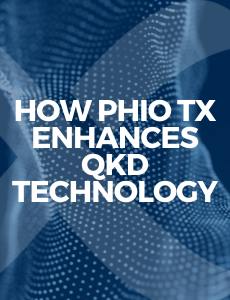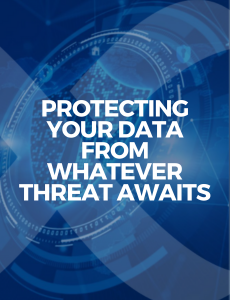Disclaimer: This blog post was written when Quantum Xchange was focused on building and selling the first quantum network in the U.S.
We have since pivoted our business and product offering, with the invention of Phio Trusted Xchange (TX), a first-of-its-kind quantum-safe, out-of-band key delivery system. While our technology offering can support QKD deployments, we are not a quantum communications provider or reseller. Our quantum-safe key exchange supports quantum keys generated from any source(QRNG or QKD) protected by any method (all PQC key encapsulation algorithms).
Quantum communications has tremendous implications for how we do business in the future. It will fundamentally change how we secure data, and security in our technology-driven world means everything. Losing that security – and our privacy – can have devastating consequences.
Quantum communications involves the generation and use of quantum states for communication protocols. Up to this point, long distance quantum communication has been a challenge due to the fragile state of the quantum particles involved, but Quantum Xchange has solved this problem.
Quantum Xchange is currently leading the way for quantum communications through Phio, the first commercial quantum network in the U.S. that leverages the only known method for transmitting a secret quantum key (known as Quantum Key Distribution, or QKD) over long distances that is provably secure. The network consists of a quantum key engine including a random quantum number generator developed by Swiss company IDQuantique (for secret key generation) and QKD-as-a-Service from Quantum Xchange. The enabling factor in the network is QuantumXchange’s Trusted Node technology, which extends the working distance of a QKD system beyond 100km and allows for secure key distribution over unlimited distances.
As progress continues on refining this technology, quantum communications has already been demonstrated in some real-world applications. Here are a few examples:
1. Banking Industry: Protecting sensitive client information
ID Quantique (IDQ) has successfully demonstrated the use of quantum communications in the banking industry to secure data. Security is critical for the banking industry because banks need to protect sensitive client and proprietary information while also ensuring data is available for transactions on a real-time basis. IDQ has effectively used their quantum random number generators (QRNG) to generate keys for security applications and cryptologic operations, such as authentication, digital signatures, and secure access control.
2. Financial Industry: Safeguarding critical business data
Quantum communications have been employed for high-security networks in the financial industry. IDQ, working with the United Kingdom’s Colt Technologies and Services Group, deployed a secure critical backbone link for financial institutions and enterprises in Geneva, Switzerland, using IDQ’s Cerberis QKD solution. Although Colt manages the network, the customers retain full control of their encryption keys and mission-critical data. Quantum keys for different clients are multiplexed over a common optical fiber, and customer data is sent over separate links, with both key and network redundancy built into the solution.
3. Credit card industry: Protecting customer credit card information.
A great deal of money is at stake when it comes to credit card security. Credit card fraud costs the world about $14 billion annually, with U.S.-based credit card fraud accounting for half of that figure. Consider Target’s 2013 data breach, which compromised about 40 million payment cards (through stolen card numbers, names, and addresses of shoppers) and carried gross costs in excess of $250 million.
Quantum communications have tremendous potential for encrypting credit cards and protecting them against this threat. New credit card encryption research based on quantum computing may solve the problem by making both magnetic stripes and EMV (Europay, MasterCard and Visa) obsolete. Researchers have proposed a solution for a truly unhackable credit card that uses quantum cryptography.
The proposed security arrangement, dubbed “quantum-secure authentication” (“QSA”), would use a strip of nanoparticles attached to a credit card instead of a magnetic stripe or a traditionally embedded computer chip. A laser directed against the nanoparticles would create a unique pattern. Since the process would involve the unique qualities of quantum mechanics, the laser-created pattern could never be observed – let alone copied. Researchers say this would present a huge advantage over traditional credit cards because the sensitive data stored on the credit card would become effectively inaccessible, even if the hacker knew the encryption key. This QSA solution could have a major worldwide economic impact if it is widely adopted.
4. Government and defense industry
Quantum communications will be tremendously beneficial for governments and defense agencies that need to protect large amounts of classified data with long-term sensitivity, both inside the country and on a global scale. Consider the 2015 malware attack on the Office of Personnel Management that resulted in 21.5 million stolen records (social security numbers, etc.).
The only effective way to ensure protection from the constant threat of cyber-attacks and espionage is through unbreakable quantum key exchange. IDQ has already started providing quantum key generation and management solutions for governments, as well as advanced QKD solutions for long-term data protection secured against future attacks by quantum computers. In one case, IDQ ensured the security of the election process in Switzerland by implementing ethernet encryption with QKD as a key element in the integrity and security of the voting in the Canton of Geneva.
5. Protecting high value/sensitive data in remote data centers.
Many private businesses, organizations and government entities are required to back up their most critical information and ensure data availability for business continuity purposes. Securing this critical information means backing up these digital assets – which can include critical financial information or intellectual property – in a remote data center, or DRC. The information needs to be protected not only in the data center itself, but also as the data transits to/from the data center. Consider all the private medical records that healthcare organizations are expected to keep. Quantum encryption, or rather quantum key distribution, has been used in several cases to provide long-term security for this data.
6. Lotteries and online gaming.
Lotteries and online gaming need to ensure complete randomness because they are all based on the use of random numbers to guarantee a uniform winning probability. IDQ has successfully provided this random number generation for several companies worldwide by using QRNG, which produces truly random numbers that are unpredictable and cannot be reproduced. Two examples of companies using the QRNG are Loterie Romande, one of Switzerland’s two lottery operators that uses the Quantis QRNG for its winning number draw application; and Austria’s Novomatic, one of the world’s leading gaming integrators.
As the technology surrounding quantum computing improves, the real-world applications of quantum communication to secure critical assets will likewise continue to grow and evolve. Although several limitations with quantum encryption still need to be addressed, overcoming the distance limitation, as QuantumXC has demonstrated through Phio, is a significant breakthrough in how we use quantum communication.
As quantum computing technology matures, real-world quantum communication applications play a significant role in securing critical assets like financial records, healthcare data, and our national defense.
@Quantum_Xchange
Quantum Xchange can help your business prepare for the future of quantum computing and the threat it poses for encrypted data transmission. Contact us for more information.



